Ten Useful Benefits of ODBC
 dOpen Database Connectivity (ODBC) is a standard and specific application programming interface (API) that helps different applications so as to access the multiple database management systems. The Structured Query Language (SQL) is used in doing so. Databases and file systems are easily accessed dynamically, by the use of ODBC interface in the COBOL applications.
dOpen Database Connectivity (ODBC) is a standard and specific application programming interface (API) that helps different applications so as to access the multiple database management systems. The Structured Query Language (SQL) is used in doing so. Databases and file systems are easily accessed dynamically, by the use of ODBC interface in the COBOL applications.
ODBC helps to provide a consistent interface regardless of any kind of server used for database. More than a single concurrent connection can be used. Different applications do not require to be attached to a different database. ‘Â With all these features, ODBC has made functioning much simpler.
With ODBC, all you have to do is specify the type of file you are accessing and the data you want, and the ODBC driver will do the rest of the work.
ODBC has many benefits. Some are summarized below:
-
It permits maximum interoperability, which means that a single application can access different database management systems.
-
It helps create a new IGSS object by inserting the record of the drawing in the table.
-
Helps to edit multiple objects at a time, by the help of templates provided.
-
You can even filter and sort out information by using relevant functions stated in the database.
-
Processing data from ALM, BCL, and even Log tables and manipulating the same in MS word or Excel.
-
Custom applications are created by the built-in functions provided in the database, like queries and macros.
-
Can easily access configuration data with the use of Visual Basic. In doing, so, the new opportunities are opened with all the additional functions provided in the programming tool.
-
Customer demand for any report can also be met by extracting relevant data and building a report in the database.
-
With all the benefits mentioned above, writing applications in C, C++, PowerBuilder, VB, Cold Fusion, Delphi, and many others, the programmers need to handle the interface to data with either of the two options. Firstly, they may have to develop unique and a non portable code for the interface of each database that the program requires. Secondly, one set of code can be written to the ODBC standard interface and use its drivers to connect from the interface to each of the database.
-
The interoperability feature helps you to develop, compile as well as deliver an application without aiming at a specific data source. Database drivers are added to link the application to the various choices of database management systems. With this interface, the application can make calls through this driver manager, which dynamically loads the required driver for the database server to which the application is connected. In return, the driver accepts the call and sends the SQL to the database and also returns the result obtained.
The ODBC interface is, therefore, well understood and easier to work upon. The advantages of interoperability and developer productivity have added to the count. It is widely accepted and adopted the product among other commercial software products. Though, the benefits are plenty, some developers merely, avoid its use as they believe that the benefit is at the expense of the application performance. This wrong myth has been long dispelled, yet some continue to hang on it. With ODBC, all you require is to specify the type of file you are accessing, and the data needed, the ODBC driver will do all the rest of the work.